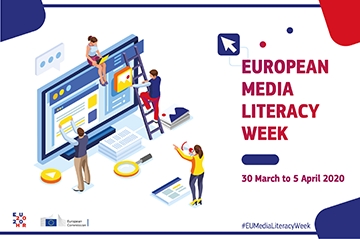
As the confinement measures are gradually being lifted in many countries in Europe, including in the seven partner countries of our project, we are yet to process the impact of the last few months on our lives, on the economy, on education, on information and on the spread of disinformation. One thing is certain – as our partner EAVI suggests, Covid-19 is already ridden with disinformation concerning its origins, its spread, the threats posed by its existence, the vaccine. The European Commission has even issued extensive guidance on disinformation around COVID-19.
In addition to proving our case and reinforcing the urgency to teach people how to identify and respond to online disinformation, which we recognized already at our launch event in March, the pandemic impacted the Get Your Facts Straight! project activities in a very practical way. The outbreak caught us when we were just about to start testing our training outline with young people and parents in Croatia, Italy, Spain, Germany, Latvia, Romania and Bulgaria. Confinement measures were imposed on all sectors, including school closures and ban on group activities. Naturally, this made it impossible to carry out the training activities with 20 young people and 20 parents planned for the end of March – beginning of April.
Facing a situation of growing need, but limited possibilities to run the training face-to-face, as initially designed, the Get Your Facts Straight! partners had to adapt the training to e-learning in a very short period of time. Like many other education and training providers across the world. And we are not going to lie – it was not easy. But partners reacted quickly and professionally and each organisation, according to their situation and resources at hand, started designing a Plan B. Partners shared solutions and strategies with each other in an open and collaborative way, in order to speed up the process, avoid the same mistakes, and support each other in these challenging times.
 Some partners opted for organizing live sessions and webinars, others decided to create a MOOC-like online course on Moodle, so that learners can access the content in their own time and pace. Other partners combined the two. Content-wise, partners updated the training contents on the go with relevant COVID-19 disinformation examples to make the workshops as relevant and up to date as possible.
Some partners opted for organizing live sessions and webinars, others decided to create a MOOC-like online course on Moodle, so that learners can access the content in their own time and pace. Other partners combined the two. Content-wise, partners updated the training contents on the go with relevant COVID-19 disinformation examples to make the workshops as relevant and up to date as possible.
This is what we have been up to over the last few months. Online learning activities started rolling out in the different partner countries already in March and are still ongoing. We had to make some choices in order to adapt the training programme to an online environment, because initially it was based on a lot of group discussions, peer-learning and interaction. On the other hand, by going online, we gave the chance to a much wider number of users to access the contents of the training and acquire valuable media literacy skills, particularly relevant in these challenging times.
In parallel to piloting the training online, we ran the #GetYourFactsStraight social media campaign in 7 languages.
Our next step in the coming months will be to finalise the piloting experience and take stock of what we have achieved and learned.
In the meantime, during the next few weeks, we will share more detailed information on how each partner faced this challenge and how the online training rolled out in each country.



















